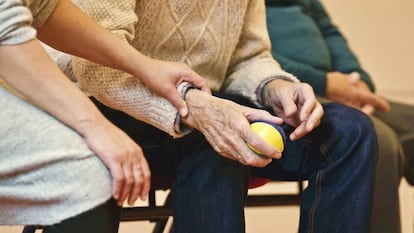Loneliness increases the chances of developing Parkinson disease
A study that followed nearly 500,000 people for over 15 years shows that those who report feeling lonely are more likely to suffer from the disease

Loneliness has many consequences in people’s lives. Numerous studies have shown that lack of companionship is detrimental to health, so much so that in some cases it increases the risk of developing diseases that increase one’s mortality risk by about 30%. Recent research published in the journal Jama Neurology reveals a correlation with Parkinson disease, a degenerative condition that still has no cure.
“Loneliness is a distressing feeling. We believe that over time it can generate physiological stress in the brain, especially in people who have other vulnerabilities,” explains Antonio Terracciano, the Florida State University geriatrician who coordinated the study. “The effects of loneliness on other aspects of life, such as obesity and cardiovascular disease, had been analyzed before. But until now, its link with Parkinson disease had not been investigated.” For 15 years, Terracciano and his team monitored a total of 491,603 participants from a biobank in the United Kingdom; at the beginning of the study, they all had to answer the same question: “Do you often feel lonely?
All participants were over the age of 50 years old when the research began, because Parkinson disease is more prevalent among older adults. To better identify the temporal relationship between loneliness and Parkinson disease, the tests were repeated every five years. The final results show that people who said they frequently felt lonely were 37% more likely to develop Parkinson disease. “This correlation holds even when other demographic factors are taken into account, such as socioeconomic status, unhealthy lifestyle habits and genetic predisposition to other diseases,” says Terracciano, although he acknowledges that some variables may attenuate the result.
There are two factors that reduce this likelihood, which the researchers have identified as possible clues for understanding the causes of the correlation. The study shows that loneliness is more likely to be associated with an increased risk of Parkinson disease through metabolic, inflammatory and neuroendocrine pathways, as the correlation decreases by 13% after accounting for chronic conditions such as diabetes. However, the variable that most attenuates the correlation between loneliness and Parkinson disease is mental health (24%). “The evidence suggests that there are bidirectional associations between loneliness and depression, which tend to occur simultaneously. These results suggest that the same thing happens with Parkinson disease, although we cannot yet say for sure which of the two happens first,” the expert notes.
“Certainly, one interesting aspect of this study is the gender variable, which the researchers show does not exist when talking about Parkinson disease,” observes María José Martín, a neurologist at the Center for Biomedical Research Network on Neurodegenerative Diseases (CIBERNED). Indeed, despite the fact that most of the people who reported feeling lonely were women, had fewer economic resources and were more likely to suffer from anxiety or depression, the study’s results do not show that women are more likely to develop Parkinson disease than men.
Uncertain origins
The Florida team’s findings complement other evidence that loneliness is a psychosocial determinant of health associated with increased risk of morbidity and mortality. A recent study from the Nanchang Neuroscience Institute in China warned that loneliness is linked to a 23% increased risk of dementia, while another study from the University of Florida, which used the same measure of loneliness as the current study, found that feeling lonely was associated with an increased risk of Alzheimer’s disease and vascular and frontotemporal dementias. “The current and previous findings suggest that loneliness may be associated with an increased risk of neurodegenerative diseases and that the detrimental effects of loneliness are not limited to a single cause or neuropathological pathway,” Terracciano explains.
Despite the results, the study does not reach a conclusion about the causes underlying the correlation; it merely sets out different interpretations of the data. In addition to the endocrine thesis, the researchers delve into the possibility that people who experience loneliness tend to engage in health-damaging behaviors, such as sedentary lifestyles. “It is true that loneliness has been studied a lot in the wake of the Covid-19 pandemic. It certainly affects aspects of immunity and inflammation. But I don’t think we can draw an accurate conclusion about whether loneliness is a cause or consequence of Parkinson disease at this point. It could be that the pathology was first, and that this feeling of loneliness was a previous symptom,” Martín says.
Nevertheless, Dr. Ana Martínez of the Center for Biological Research (CIB-CSIC), who did not participate in this study, celebrates this research because it is the first to investigate this correlation, which had already been observed in other neurodegenerative diseases. “Basically, this study says that a person’s emotional state influences the prevention or delay of Parkinson disease. Although it doesn’t offer solid explanations as to why [that is the case], it’s admittedly pretty good advice for the general population. It is not going to do any harm, and it will probably end up being like Alzheimer’s disease, where it has been shown that positive character has helped prevention,” the expert believes.
Sign up for our weekly newsletter to get more English-language news coverage from EL PAÍS USA Edition
Tu suscripción se está usando en otro dispositivo
¿Quieres añadir otro usuario a tu suscripción?
Si continúas leyendo en este dispositivo, no se podrá leer en el otro.
FlechaTu suscripción se está usando en otro dispositivo y solo puedes acceder a EL PAÍS desde un dispositivo a la vez.
Si quieres compartir tu cuenta, cambia tu suscripción a la modalidad Premium, así podrás añadir otro usuario. Cada uno accederá con su propia cuenta de email, lo que os permitirá personalizar vuestra experiencia en EL PAÍS.
¿Tienes una suscripción de empresa? Accede aquí para contratar más cuentas.
En el caso de no saber quién está usando tu cuenta, te recomendamos cambiar tu contraseña aquí.
Si decides continuar compartiendo tu cuenta, este mensaje se mostrará en tu dispositivo y en el de la otra persona que está usando tu cuenta de forma indefinida, afectando a tu experiencia de lectura. Puedes consultar aquí los términos y condiciones de la suscripción digital.









































